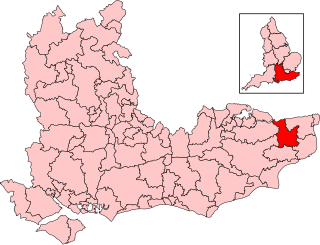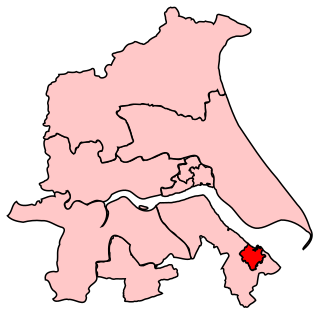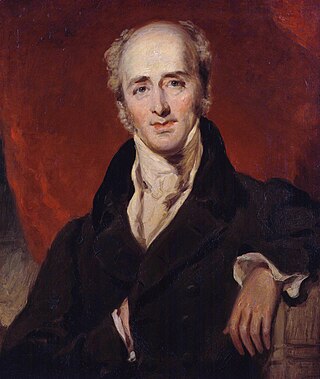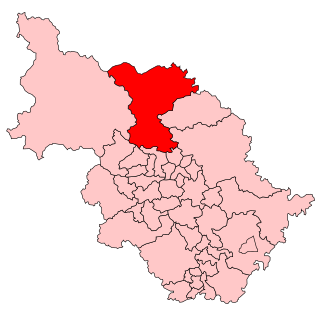Related Research Articles

The Representation of the People Act 1867, known as the Reform Act 1867 or the Second Reform Act, is an act of the British Parliament that enfranchised part of the urban male working class in England and Wales for the first time, extending the franchise from landowners of freehold property above a certain value, to leaseholders and rental tenants as well. It took effect in stages over the next two years, culminating in full commencement on 1 January 1869.

Canterbury is a constituency in Kent represented in the House of Commons of the UK Parliament since 2017 by Rosie Duffield formerly of the Labour Party and since September 2024 an Independent.

Stockport is a constituency represented in the House of Commons of the UK Parliament since 2019 by Navendu Mishra of the Labour Party.

Wigan is a constituency in Greater Manchester, represented in the House of Commons of the Parliament of the United Kingdom. The seat has been represented by Lisa Nandy of the Labour Party since 2010. Nandy currently serves as Secretary of State for Culture, Media and Sport under the government of Keir Starmer.

Great Grimsby was a constituency in North East Lincolnshire represented in the House of Commons of the Parliament of the United Kingdom since December 2019 by Lia Nici of the Conservative Party. Between 1918 and 1983 it was known simply as Grimsby; following the 2023 Periodic Review of Westminster constituencies, the seat was subject to boundary changes, incorporating the neighbouring town of Cleethorpes. As a consequence, it was renamed Great Grimsby and Cleethorpes, first contested at the 2024 general election.

Ipswich is a constituency represented in the House of Commons of the UK Parliament since July 2024 by Jack Abbott of the Labour Party.

The 1831 United Kingdom general election was held on 28 April 1831 to 1 June 1831, to elect members of the House of Commons, the lower house of Parliament. It saw a landslide win by supporters of electoral reform, which was the major election issue. As a result, it was the last unreformed election, as the following Parliament ensured the passage of the Reform Act 1832. Polling was held from 28 April to 1 June 1831. The Whigs won a majority of 136 over the Tories, which was as near to a landslide as the unreformed electoral system could deliver. As the Government obtained a dissolution of Parliament once the new electoral system had been enacted, the resulting Parliament was a short one and there was another election the following year. The election was the first since 1715 to see a victory by a party previously in minority.

Lancaster was a constituency of the House of Commons of the Parliament of England then of the Parliament of Great Britain from 1707 to 1800 and of the Parliament of the United Kingdom from 1801 to 1867, centred on the historic city of Lancaster in north-west England. It was represented by two Members of Parliament until the constituency was disenfranchised for corruption in 1867.

Maldon is a constituency in Essex represented in the House of Commons of the UK Parliament since its recreation in 2010 by Sir John Whittingdale, a Conservative.
Oxford University was a university constituency electing two members to the British House of Commons, from 1603 to 1950. The last two members to represent Oxford University when it was abolished were A. P. Herbert and Arthur Salter.
Bewdley was the name of a constituency of the House of Commons of the Parliament of the United Kingdom from 1605 until 1950. Until 1885 it was a parliamentary borough in Worcestershire, represented by one Member of Parliament; the name was then transferred to a county constituency from 1885 until 1950. Its MPs included the former Prime Minister Stanley Baldwin, who represented the seat from 1908 to 1937, and afterwards took the name of the constituency as part of his title when he was raised to the peerage.

Ripon was a constituency sending members to the House of Commons of England, Great Britain and the House of Commons of the Parliament of the United Kingdom until 1983, centred on the city of Ripon in North Yorkshire.

Beverley has been the name of a parliamentary constituency in the East Riding of Yorkshire for three periods. From medieval times until 1869 it was a parliamentary borough consisting of a limited electorate of property owners of its early designated borders within the market town of Beverley, which returned (elected) two Members of Parliament to the House of Commons of the English and Welsh-turned-UK Parliament during that period.
Liverpool was a borough constituency in the county of Lancashire of the House of Commons for the Parliament of England to 1706 then of the Parliament of Great Britain from 1707 to 1800 and of the Parliament of the United Kingdom from 1801 to 1885. It was represented by two Members of Parliament (MPs). In 1868, this was increased to three Members of Parliament.
North East Lancashire was a county constituency of the House of Commons of the Parliament of the United Kingdom. The constituency was created by the Reform Act of 1867 and replaced the North Lancashire Parliamentary constituency, a county division with two seats.
Cricklade was a parliamentary constituency named after the town of Cricklade in Wiltshire.
Knaresborough was a parliamentary constituency which returned two Members of Parliament (MPs) to the Parliament of England, Parliament of Great Britain and the House of Commons of the Parliament of the United Kingdom until 1868, and then one MP until its abolition in 1885.
Ilchester was a constituency of the House of Commons of the Parliament of England, then of the Parliament of Great Britain from 1707 to 1800 and of the Parliament of the United Kingdom from 1801 to 1832. It was represented by two Members of Parliament until 1832. It was one of the most notoriously corrupt rotten boroughs.
Kendal was a parliamentary borough centred on the town of Kendal in Westmorland. It returned one Member of Parliament (MP) to the House of Commons of the Parliament of the United Kingdom, elected by the first past the post system.
Liskeard was a parliamentary borough in Cornwall, which elected two Members of Parliament (MPs) to the House of Commons from 1295 until 1832, and then one member from 1832 until 1885. The constituency was abolished by the Redistribution of Seats Act 1885.
References
- 1 2 "Representation of Liverpool". Manchester Courier and Lancashire General Advertiser. Vol. 6, no. 301. 2 October 1830. p. 4. Retrieved 11 January 2023– via Newspapers.com.
- 1 2 3 4 5 Escott, Margaret. "Liverpool". The History of Parliament. Retrieved 11 January 2023.
- ↑ "Representation of Liverpool". Manchester Courier and Lancashire General Advertiser. Vol. 6, no. 301. 2 October 1830. p. 2. Retrieved 11 January 2023– via Newspapers.com.
- 1 2 "Representation of Liverpool". Sheffield and Rotherham Independent. Vol. 11, no. 566. 23 October 1830. p. 4. Retrieved 11 January 2023– via Newspapers.com.
- ↑ Vindex (12 November 1830). "To the Editors of the Liverpool Mercury". Liverpool Mercury. Vol. 20, no. 1019. p. 8. Retrieved 11 January 2023– via Newspapers.com.
- ↑ Stooks Smith, Henry. (1973) [1844–1850]. Craig, F. W. S. (ed.). The Parliaments of England (2nd ed.). Chichester: Parliamentary Research Services. pp. 180–184. ISBN 0-900178-13-2.
- ↑ No title. The Morning Chronicle. Vol. 19, no. 47. 6 May 1831. p. 2. Retrieved 11 January 2023– via Newspapers.com.
{{cite news}}: CS1 maint: untitled periodical (link)